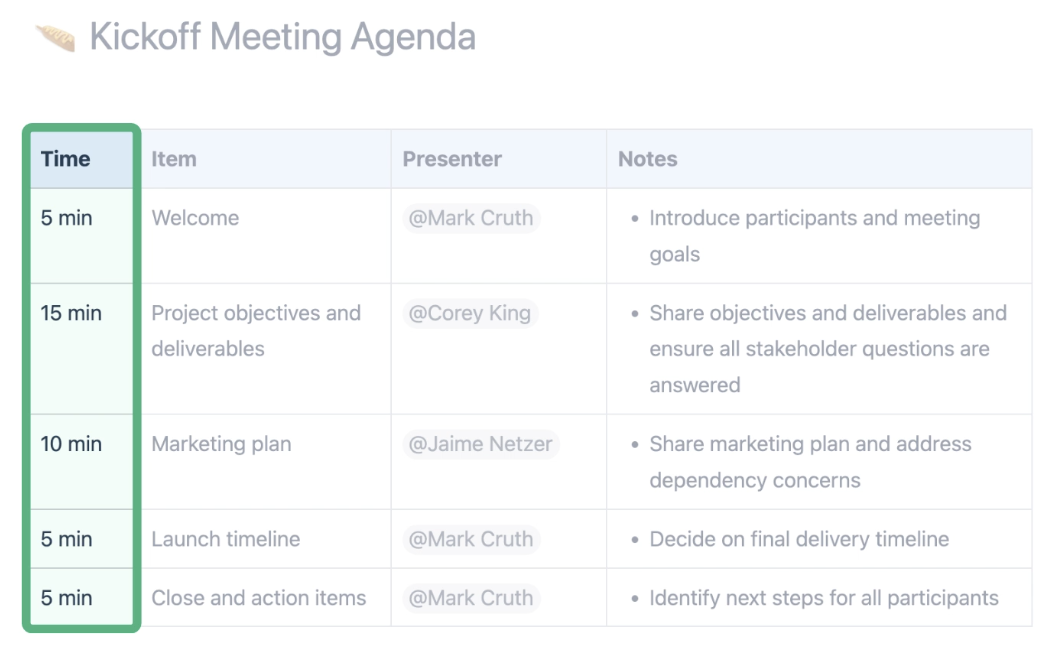Phase: Preparation
Preparation Principles
-
It's one of the most important stages in the entire process. This stage is all about doing the right pre-work and sharing that out with your participants before the meeting ever starts.
-
Pre-work is essential for transforming your meetings and preventing unnecessary waste.
-
And so as we think about preparing for a meeting, there's a couple things you need to keep in mind. When you actually say "I need this meeting," the first thing you do is not set up the meeting.
-
The first thing you need to do before you send anything out: build an agenda. What are the topics you want to cover in this agenda? This goes back to that idea being very intentful with your time, thinking about the outcomes.
-
Focus on time boxing the agendas. Focus in on doing things like maybe setting aside 10 to 15 minute increments for each item on your agenda. Anything more than that and people might find themselves kind of drifting off or you might start wandering off topic.
-
Within your agenda, make sure you've identify what's the outcome for each one of those topics? Yes, I want to present on something, but why am I presenting it? Again am I information sharing? Am I trying to make a decision with this group? Am I trying to gather ideas?
-
Be very explicit and then also identify who's going to own that topic. Who is going to help drive that conversation. Even though you may be the facilitator, someone is presenting that topic and your role is to help ensure that we hit that outcome and maintain that time box.
1 -
Now this goes back down to again the intent of the meeting. What are you trying to do? Don't blast out that invite to multiple people and just hope you get the right folks. For every person you add to the invite, make sure you ask yourself the question what's in it for this person to spend time in my meeting versus going somewhere else or doing something else.
-
The thing is if you say well they just need to be here, that's not a good enough answer. Go through and say well, what is their role gonna be in this meeting? Are they gonna help me make a decision? Do I need their expertise in something? Or are they part of a team that I need to share information with?
-
Again be very explicit with who you're bringing and why. And at that point, that's when you can invite them. That way they recognize this is the role I'm going to play versus "Hey, should I be here?"
-
And so once you've actually built out your agenda, you've actually figured out who needs to attend then and only then should you go ahead and send out an invite.
-
In that invite make sure that in the description. Either included the actual copy and paste agenda or you've included a link to something like a Confluence page.
-
Never ever ever send a meeting invite with that says "Agenda to come." That is just a way to cop out of actually putting together that agenda doing that preparation.
-
As you're getting prepared for your meeting, are there any other tools or tips to use?
-
To me all goes back to again, what do you want to try to achieve in the meeting? What's the intent of the meeting?
-
If you're having a one-way information sharing meeting, tools like PowerPoint and Keynote are great for that. They help convey information very well to an audience.
-
Now if you're in a more of a collaborative meeting, maybe you're trying to make a decision or maybe you're just trying to brainstorm things. There's other tools out there.
-
Confluence is really good for sharing information and allowing people to kind of review and collaborate on it. Tools like Mural/ draw.io are really great whiteboarding tools that allow you to go in and actually have some rapid brainstorming.
-
You can even use polling tools like Slido or Mentimeter. These are great tools that I've found in my meetings that I like to employ at certain times to kind of get the poll of the room. Especially in a large group on a certain question that I have.
-
So think creatively about how you can use tools to one engage your audience. But then also make sure when you're using those tools you're using them with intent.
-
You're not just using them because you can. And another pro tip here is if you're going to use these tools, make sure you get those tools prepped beforehand.
-
I hate going into a meeting and someone's like, "Oh look, we're gonna review this Confluence page and I don't know where it is." Be prepared. Link that in your agenda. What are we going to review, where we gonna do it?
-
At the end, sharing Minutes of Meeting (MoM) to the attendees helps to keep the context with target audience. Also if any to-do/ pending action to be taken by you/ someone else can be specified in follow up mail once the meeting is over.